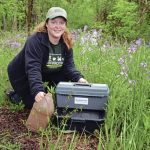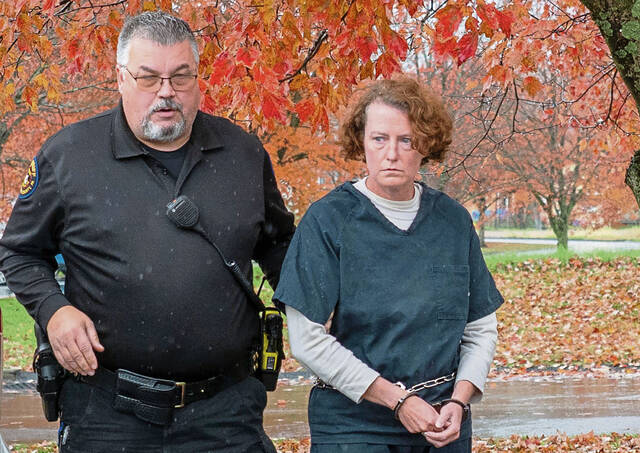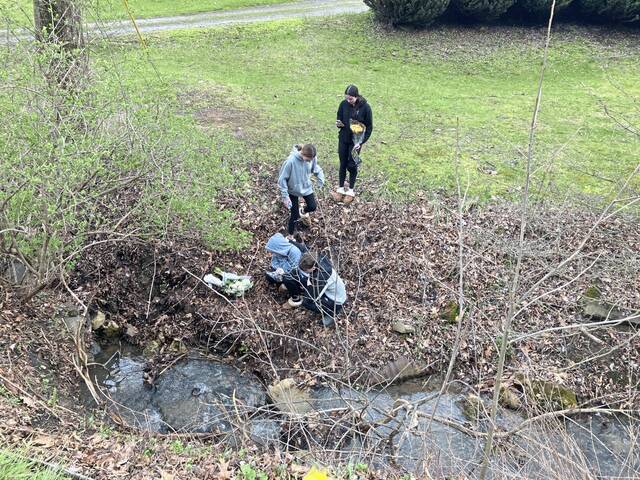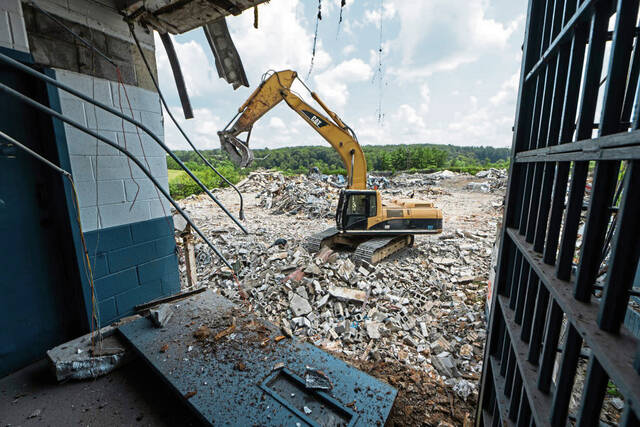Mosquito season has arrived in Westmoreland County and, just in time, so has a new staffer to oversee monitoring of those insects for the West Nile virus they can spread.
Christina Edwards-McCune of Trafford came on board May 9 as the new West Nile virus program technician for the Hempfield-based Westmoreland Conservation District.
Most days, she’s busy in the field checking mosquito traps placed in about 60 areas of established concern.
According to Greg Phillips, district manager and CEO for the conservation district, the traps “tend to be in more urban areas, where there are gutters and areas of stagnant water” — potential breeding grounds for mosquitoes.
Each week, Edwards-McCune sets at least 15 traps, which typically snare between 50 and 100 mosquitoes over a 24-hour period. Resulting mosquito samples are sent to the state Department of Environmental Protection for testing to see if they are positive for infection with the West Nile virus.
“If I get a positive when I’m collecting mosquitoes, I’ll set another trap nearby,” she said.
She deploys two kinds of traps. Gravid traps use stagnant “bait” water and a battery-operated fan to “collect adult female mosquitoes that have already taken a blood meal and are looking to lay their eggs,” she said.
BG Sentinel traps are set to collect mosquito species, such as the Asian Tiger variety, that are aggressive human biters and are looking for a blood meal. Edwards-McCune explained they are baited with dry ice to mimic the carbon dioxide that humans emit.
Last year, three mosquito samples collected in Westmoreland County from May through early October tested positive for West Nile virus. For the third year in a row, no human cases of the disease were reported in the county.
Most people who are infected with the West Nile virus don’t develop any symptoms, as noted by the Centers for Disease Control and Prevention. Hospitalization and respiratory support may be required in more severe cases. West Nile encephalitis or meningitis can lead to a high fever, neck stiffness, stupor, disorientation, coma, tremors, convulsions, muscle weakness and paralysis.
Edwards-McCune also will collect tick samples, which are tested for the presence of Lyme disease. Three Westmoreland tick samples tested positive for Lyme disease in 2021.
According to the state Department of Health, Lyme disease can cause flu-like symptoms and a rash in the early stages, but can progress to arthritic, neurological and cardiac symptoms if it is not treated.
Edwards-McCune filled a slot left open when her predecessor accepted a job with an engineering firm.
The West Nile position also entails educating residents on how they can reduce mosquito and tick populations — for instance, by recycling discarded tires that otherwise can collect rainwater and can become a haven for mosquitoes. Last year, the West Nile virus program sponsored information booths at the Westmoreland Fair and a Ligonier flower show; it also partnered with Westmoreland Cleanways and Recycling to collect more than 800 tires.
Edwards-McCune has a degree in environmental studies from California University of Pennsylvania. She brings to her role experience as a fisheries biologist aide with the Southwestern Region of the Pennsylvania Fish and Boat Commission. She previously worked as a fish and wildlife technician with the New York State Department of Environmental Conservation.
Ligonier resident oversees erosion control
Samantha Dull of Ligonier is another new addition to the conservation district staff. She has taken on the role of erosion control specialist, a job that became open through a series of promotions triggered by the retirement of agriculture technician Dan Griffith.
Erosion-related tasks include reviewing construction plans and inspecting construction sites to ensure there are proper measures in place to control soil erosion and stormwater.
Dull has her work cut out for her. “There are so many projects and plan permits,” said Phillips. “There’s plenty to do.”
Dull is a 2019 environmental science graduate of Saint Vincent College who is working toward a master’s degree in geological engineering from the University of Arizona.
She previously was involved in similar conservation work in Indiana County and tested water samples in accordance with federal Department of Environmental Protection’s standards.
Visit westmorelandconservation.org to learn about conservation district programs and services.











